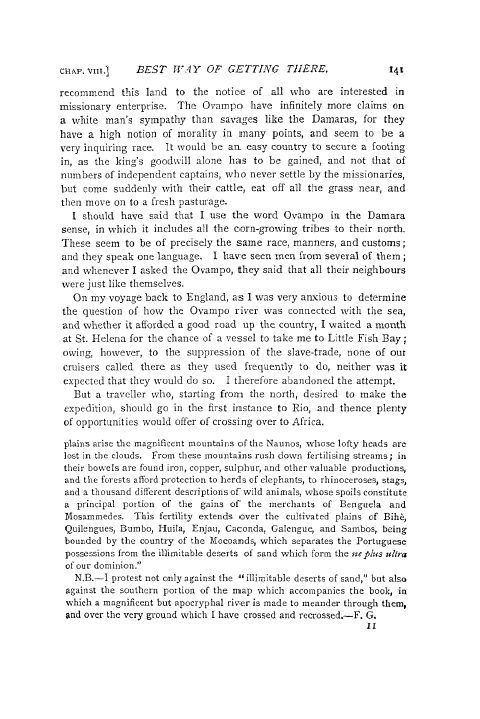. vrrt.] BEST WAY OF GETTING THERE.
I4t
recommend this land to the notice of all who are interested in missionary enterprise. The Ovampo have infinitely more claims on a white man's sympathy than savages like the Damaras, for they have a high notion of morality in many points, and seem to be a very inquiring race. It would be an easy country to secure a footing in, as the king's goodwill alone has to be gained, and not that of numbers of independent captains, who never settle by the missionaries, but come suddenly with their cattle, eat off all the grass near, and then move on to a fresh pasturage.
I should have said that I use the word Ovampo in the Damara sense, in which it includes all the corn-growing tribes to their north. These seem to be of precisely the same race, manners, and customs; and they speak one language. I have seen men from several of them; and whenever I asked the Ovampo, they said that all their neighbours were just like themselves.
On my voyage back to England, as I was very anxious to determine the question of how the Ovampo river was connected with the sea, and whether it afforded a good road up the country, I waited a month at St. Helena for the chance of a vessel to take me to Little Fish Bay; owing, however, to the suppression of the slave-trade, none of out cruisers called there as they used frequently to do, neither was it expected that they would do so. I therefore abandoned the attempt.
But a traveller who, starting from the north, desired to make the expedition, should go in the first instance to Rio, and thence plenty of opportunities would offer of crossing over to Africa.
plains arise the magnificent mountains of the Naunos, whose lofty heads are lost in the clouds. From these mountains rush down fertilising streams; in their bowels are found iron, copper, sulphur, and other valuable productions, and the forests afford protection to herds of elephants, to rhinoceroses, stags,
and a thousand different descriptions of wild animals, whose spoils constitute a principal portion of the gains of the merchants of Benguela and Mosammedes. This fertility extends over the cultivated plains of Bihe, Quilengues, Bumbo, Huila, Enjau, Caconda, Galengue, and Sambos, being bounded by the country of the Mocoands, which separates the Portuguese possessions from the illimitable deserts of sand which form the ne plus ultra of our dominion."
N.B.-I protest not only against the "illimitable deserts of sand," but also against the southern portion of the map which accompanies the book, in which a magnificent but apocryphal river is made to meander through them, and over the very ground which I have crossed and recrossed.-F. G.
11

